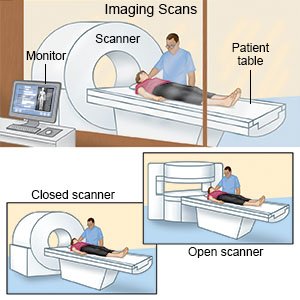Magnetic Resonance Imaging
Medically reviewed by Drugs.com. Last updated on Aug 4, 2025.
What do I need to know about magnetic resonance imaging (MRI)?
An MRI is a test that uses magnetic fields and radio waves to take pictures inside your body. An MRI is used to see blood vessels, tissue, muscles, and bones. It can also show organs, such as your heart, lungs, or liver. An MRI can help your healthcare provider diagnose or treat a medical condition. It does not use radiation.
How do I prepare for an MRI?
- Tell your healthcare provider about all your current medicines. Your provider will tell you which medicines to take or not take on the day of your MRI. You may be given medicine to help you feel calm and relaxed during the MRI.
- Tell your provider if you have ever had an allergic reaction to contrast liquid. Contrast liquid may be used to help a body part show up more clearly.
- Tell your provider if you know or think you are pregnant.
- Tell your provider if you have any metal in your body, such as a pacemaker, implant, dentures, or aneurism clip. Tell your provider if you have a tattoo or wear a medicine patch.
- Remove any metal items, such as hair clips, jewelry, glasses, hearing aids, or dentures before you enter the MRI room.
Related medications
What will happen during an MRI?
Your healthcare provider will ask you to lie on a table. The table will be moved into an open space in the middle of the machine. You will need to lie still during the MRI. It is normal to hear knocking, thumping, or clicking noises from the machine.
 |
What are the risks of an MRI?
An MRI may cause a metal object in your body to move out of place. This may cause serious injury, or stop the object from working properly.
Care Agreement
You have the right to help plan your care. Learn about your health condition and how it may be treated. Discuss treatment options with your healthcare providers to decide what care you want to receive. You always have the right to refuse treatment. The above information is an educational aid only. It is not intended as medical advice for individual conditions or treatments. Talk to your doctor, nurse or pharmacist before following any medical regimen to see if it is safe and effective for you.© Copyright Merative 2025 Information is for End User's use only and may not be sold, redistributed or otherwise used for commercial purposes.
Further information
Always consult your healthcare provider to ensure the information displayed on this page applies to your personal circumstances.
